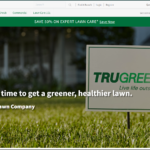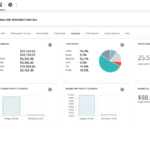As a landscaping business owner, you understand the importance of reaching your target audience and standing out in a competitive market. Landscaping is a competitive industry that requires constant innovation and creativity to stand out from the crowd.
If you want to grow your landscaping business, you must invest in digital marketing strategies to help you reach more potential customers, generate more leads, and increase your sales.
A good digital marketing strategy for landscaping uses online platforms and channels to promote your products or services. It includes various tactics such as website design, search engine optimization (SEO), social media marketing, email marketing, pay-per-click (PPC) advertising, and more.
In this post, we will share some of the best digital marketing strategies for landscaping businesses and categorize them by channels.
These strategies will help you:
- Improve your online presence and visibility
- Attract more local customers who are looking for landscaping services
- Showcase your portfolio and testimonials
- Build trust and credibility with your audience
- Nurture your leads and convert them into loyal customers
- Get more landscaping jobs
- Increase retention of your clients
- Increase your customer lifetime value
Let’s get started!
Landscaping Website
Why do landscapers need a website?
- Helpful in building a brand that people trust
- Generate landscaping leads from the landscaping website
- Be visible to new audiences that do not know you exist yet
- Provide support to your existing customers
- Establish yourself as an authority on landscaping topics
- Publish important information that can be accessed from anywhere. Examples would include your contact information, about your company, your past projects, where you serve, your mission and vision, service schedules etc.
Website strategies for growing a landscaping business
- Publish landing pages for your key products and services.
- Create PPC landing pages separately with CRO to get leads
- Publish a homeowner’s hub/blog
- Use social proof such as customer reviews, testimonials on page folds, case studies, and your checkout page.
- Do SEO use money keywords and technical optimizations?
- Use chatbots to engage with potential customers and answer their queries.
- Use exit-intent popups to capture leads before they leave your website.
- Use heatmaps to analyze user behaviour and optimize your website’s design and content.
- Use retargeting ads to reach potential customers who have visited your website but haven’t converted yet.
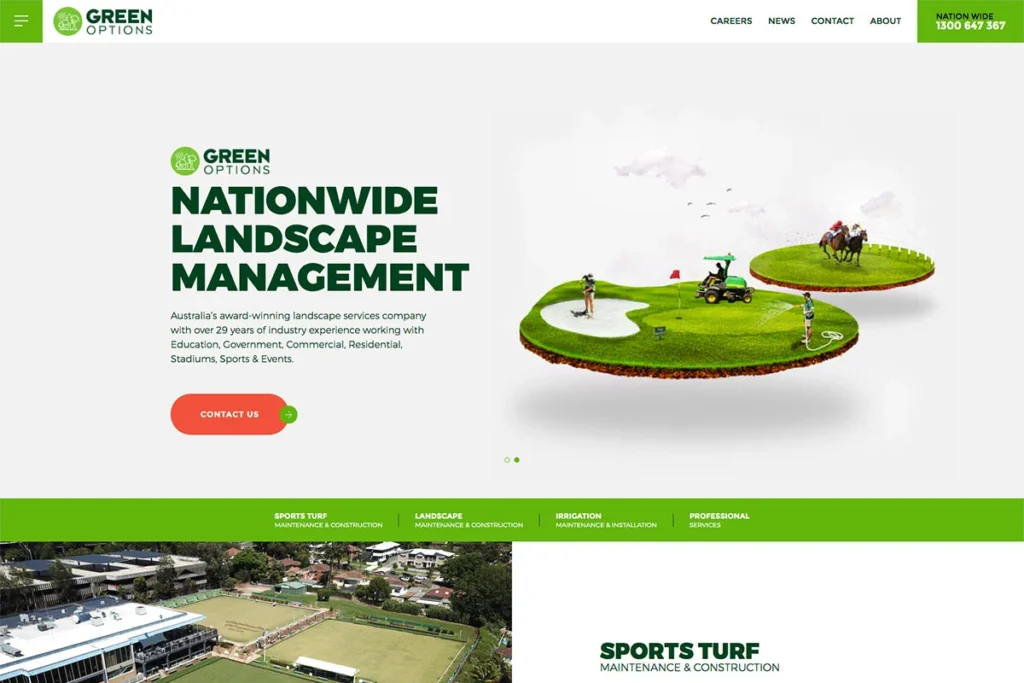
Why email marketing for a landscaping business?
- Regular email updates help keep your landscaping business at the top of your customers’ minds, increasing the likelihood of repeat business.
- Email marketing is relatively inexpensive and offers a high return on investment compared to other marketing channels.
- An email drip campaign for cold leads helps you close more deals. You can still get more out of your old list of deals.
- Nurture campaigns for older leads help potential customers not ready to buy from you move further down the funnel.
- A strategic email campaign can generate traffic to your website.
- Emails can help distribute content and educate your prospects.
Email marketing strategies for growing a landscaping business
- Send regular newsletters(preferably weekly) to your subscribers to update them about your services, new projects, and industry news.
- Send promotional emails to your subscribers with special offers, discounts, or exclusive deals. This can encourage them to use your services.
- Set up automated emails for different customer actions. For example, a welcome email when someone subscribes to your newsletter, a thank you email after a purchase, or a follow-up email after a service is completed.
- Segment your email list based on various factors, such as location, type of service availed, etc. This allows you to send more targeted and personalized emails.
- Use email analytics to track open rates, click-through rates, and conversions. This data can help you understand what’s working and what’s not, allowing you to optimize your email marketing strategy.
- Since landscaping business requirements change with the season, friendly email reminders to maintain garden structures and people’s backyards can help you retain customers.
- Retarget your old leads to reengage people who didn’t engage with your brand the first time.
For email marketing, you need contact emails and the names of people you’ll reach out to. Do not buy email lists from third parties.
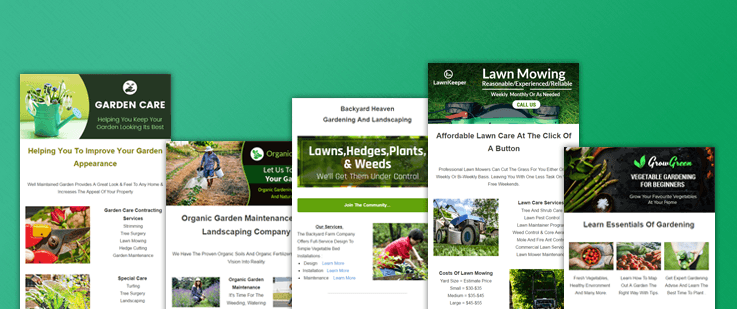
Google my business
Why Google My Business for a Landscaping Business?
- It helps your business appear in local search results, increasing your visibility among potential customers in your area.
- It allows you to share important information about your business, such as your hours of operation, location, and services offered.
- It provides a platform for customers to leave reviews, which can help build trust and credibility.
- It offers insights into how customers interact with your business online, which can inform your marketing strategy.
Google My Business strategies for growing a landscaping business
- Claim and verify your business listing to ensure the information displayed is accurate and up-to-date.
- Encourage satisfied customers to leave positive reviews and respond promptly and professionally to negative feedback.
- Use the post feature to share updates, special offers, or upcoming events. Keep consistency in sharing updates. The more you update, the more you increase your chances of getting top results.
- Add photos of your completed projects to showcase your work and attract potential customers.
- Use Google My Business insights to understand how people find your business and where they are coming from.
- Optimize your listing with relevant keywords to improve your visibility in search results.
- Regularly check and update your listing to ensure accurate and up-to-date information.
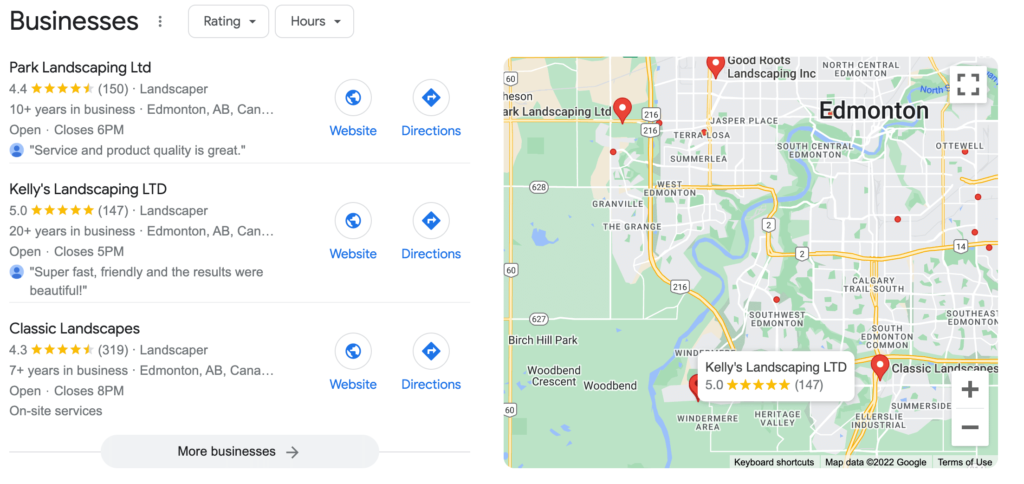
Search Engine Optimisation
Why SEO for a landscaping business?
- SEO helps your website rank higher in search engine results, increasing your visibility to potential customers.
- It drives organic traffic to your website, which can lead to more leads and sales.
- It helps establish your business as an authority in the landscaping industry.
- It improves your website’s user experience, making visitors more likely to stay longer and engage with your content.
SEO strategies for growing a landscaping business
- Conduct keyword research to understand what terms your potential customers use to find services like yours. Optimize your website content with these keywords.
- Create high-quality, informative content that answers common questions your potential customers might have. This will not only help with SEO but also establish your business as an authority in the landscaping industry.
- Use local SEO strategies to attract customers in your area. This includes optimizing your website with local keywords, claiming your business listing on Google My Business, and encouraging customers to leave reviews.
- Build high-quality backlinks to your website. This will improve your SEO and increase your website’s credibility.
- Use SEO tools to track your rankings, monitor your backlinks, and analyze your website traffic. This data can provide valuable insights into your SEO strategy and help you make necessary adjustments.
Also read: Landscaping Keywords for your SEO Campaign

Google, Facebook, Instagram, X, LinkedIn Ads
Why Google Ads for a Landscaping Business?
- Google Ads can help your business reach a wider audience, increasing your visibility to potential customers.
- It allows you to target specific demographics, locations, and keywords, ensuring the right people see your ads.
- It provides measurable results, allowing you to track the effectiveness of your ads and make necessary adjustments.
- It offers a high return on investment, as you only pay when someone clicks on your ad.
Google Ads strategies for growing a landscaping business
- Use keyword research to identify the terms your potential customers use to find services like yours. Use these keywords in your ads to increase their visibility in search results.
- Create compelling ad copy that highlights the unique benefits of your services. Include a clear call to action to encourage potential customers to click on your ad.
- Use location targeting to ensure potential customers see your ads in your service area.
- Set up conversion tracking to measure the effectiveness of your ads. This can help you understand which ads drive leads and sales and which need to be adjusted.
- Use remarketing campaigns to reach people who have previously visited your website but did not make a purchase.
- Review and optimize your campaigns regularly based on performance data. This can help you maximize your return on investment and ensure your ads reach the right audience.

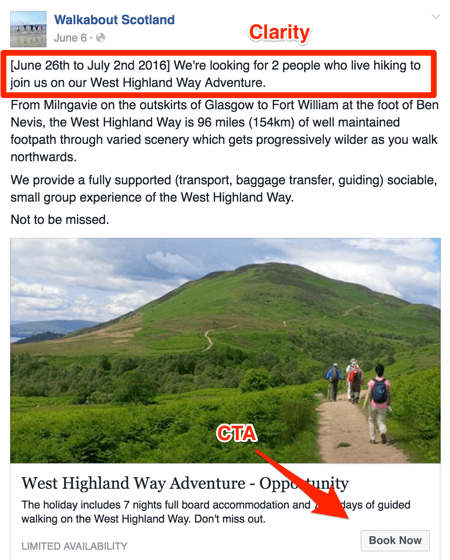
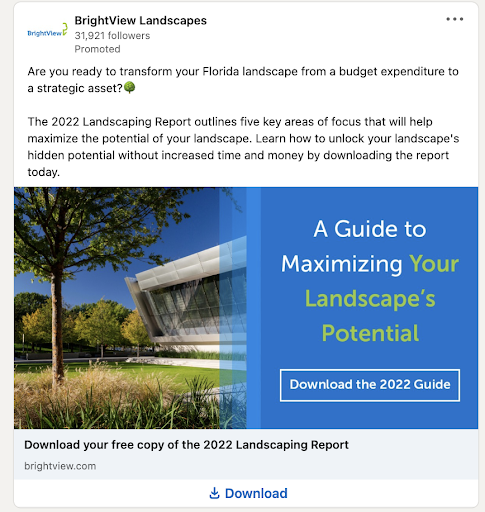
Partnership and affiliate Programs
Why Affiliate Programs for a landscaping business?
- Affiliate programs can help your business reach a wider audience, increasing your visibility to potential customers.
- It allows you to leverage the networks of your affiliates, ensuring your services are promoted to the right people.
- It provides measurable results, allowing you to track the effectiveness of your affiliate program and make necessary adjustments.
- It offers a high return on investment, as you only pay when a sale is made through an affiliate link.
Affiliate Programs strategies for growing a landscaping business
- Identify potential affiliates who have a strong presence in your target market. This could be bloggers, influencers, or other businesses that complement your services.
- Create a compelling affiliate program that offers competitive commissions to attract quality affiliates.
- Provide your affiliates with the tools and resources to effectively promote your services. This could include promotional materials, tracking tools, and training.
- Monitor the performance of your affiliates and provide feedback and support to help them succeed.
- Review and optimize your affiliate program regularly based on performance data. This can help you maximize your return on investment and ensure your services are being promoted effectively.
Also Read:
- Landscaping Affiliate Programs #1 (Service/SaaS/Software)
- Lawn Care Affiliate Programs #2 (Products)
- Lawn Care Affiliate Programs 101
- Guide to Creating an Affiliate Program

Influencer marketing
Why Influencer Marketing for a Landscaping Business?
- It allows you to leverage influencers’ followers, ensuring your services are promoted to the right people.
- Influencers can create unique content about your services, providing a fresh perspective to their followers.
- It offers a unique marketing channel that can complement your other digital marketing strategies.
Influencer Marketing Strategies for Growing a Landscaping Business
- Identify potential influencers who have a strong presence in your target market. This could be bloggers, vloggers, or social media personalities with a significant following in the home improvement or outdoor lifestyle space.
- Collaborate with influencers to create engaging content about your services. This could be a video of a landscaping project, a blog post about your services, or social media posts showcasing your work.
- Provide influencers with the necessary information and resources to promote your services effectively. This could include details about your services, promotional materials, or even arranging a visit to one of your landscaping projects.
- Monitor the performance of your influencer marketing campaigns and provide feedback and support to help them succeed.
- Review and optimize your influencer marketing strategy regularly based on performance data. This can help you maximize your return on investment and ensure your services are being promoted effectively.
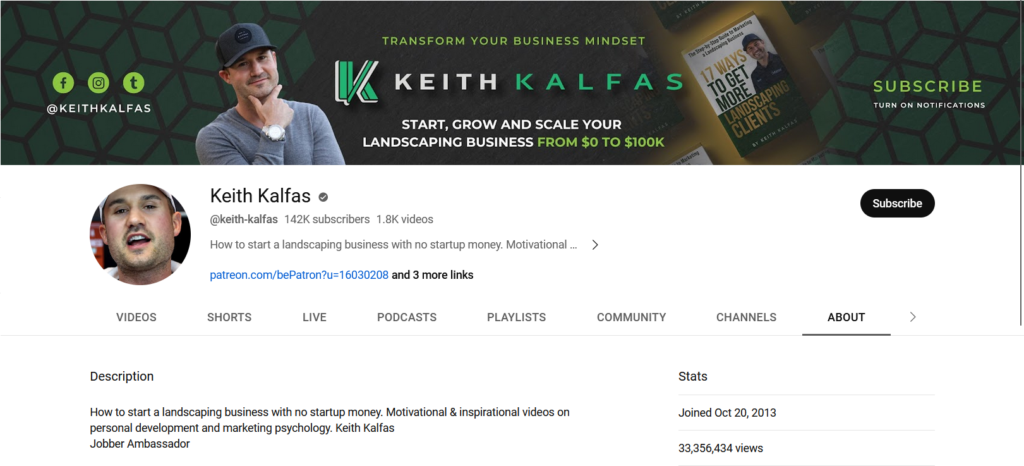
External listings and lead generation sites
Why External Listings for a Landscaping Business?
- It allows you to leverage these platforms’ user base, ensuring your services are promoted to the right people.
- It provides an additional channel for customers to discover your services.
- It provides a platform for customers to request quotes or book services, making engaging with your business easier.
- It offers a platform for customers to leave reviews, which can help build trust and credibility.
- It offers a high return on investment, as you only pay when a lead is generated.
External Listings Strategies for Growing a Landscaping Business
- Identify potential listing sites that have a strong presence in your target market. Local business directories, home improvement sites, or other platforms catering to your industry.
- Ensure your business information is accurate and up-to-date on all listing sites. This includes your business name, contact information, services offered, and other relevant details.
- Encourage satisfied customers to leave positive reviews on these platforms and respond promptly and professionally to any negative feedback.
- Regularly review and update your listings to ensure accurate and up-to-date information.
- Use these platforms to showcase your work by uploading photos of your completed projects.
- Respond promptly to any leads generated through these platforms.
- Regularly review and optimize your profiles based on performance data.
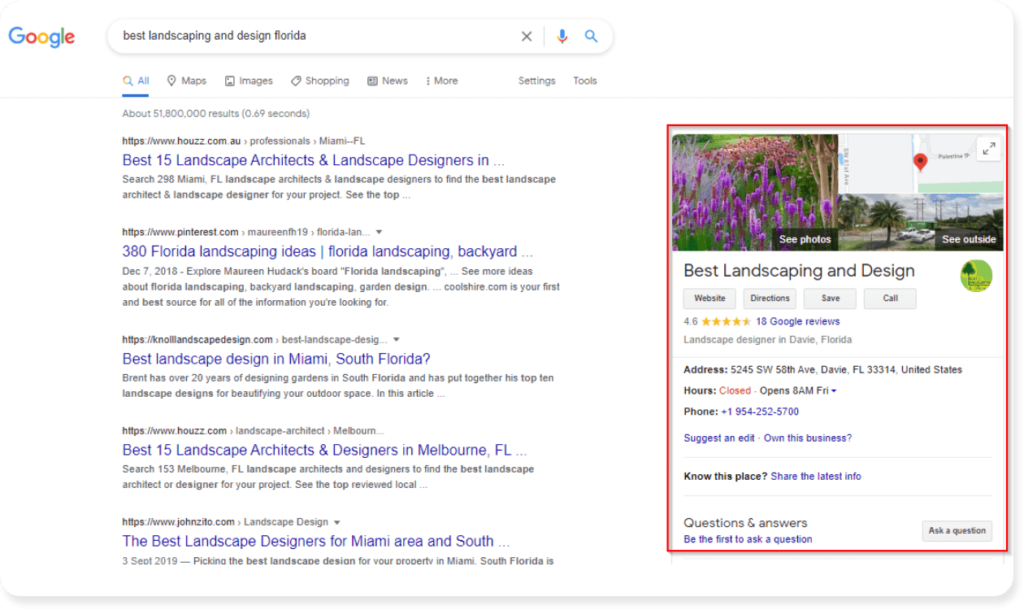
Case study marketing
Why Case Study Marketing
- Case studies provide real-world examples of your work, showcasing your skills and expertise.
- They build trust and credibility by showing potential customers the results you’ve achieved for others.
- They provide valuable content for your website, improving SEO and driving traffic.
Case Study Marketing Strategies for Growing a Landscaping Business
- Look for projects that significantly impacted, solved a unique problem, or involved innovative techniques. These make for compelling case studies.
- Take before and after photos, keep track of the challenges faced and solutions implemented, and gather testimonials from satisfied clients.
- Start by addressing the client’s problem, explaining your solution, and highlighting the results. Use a storytelling approach to engage your audience.
- Share them on your website, social media, email newsletters, and other marketing channels. You can also use them in sales presentations to show potential clients what you can do.
- As you complete new projects, add them to your collection of case studies. This keeps your content fresh and relevant.
- Use analytics to see how people are interacting with your case studies. Use this data to improve your content and promotion strategies.
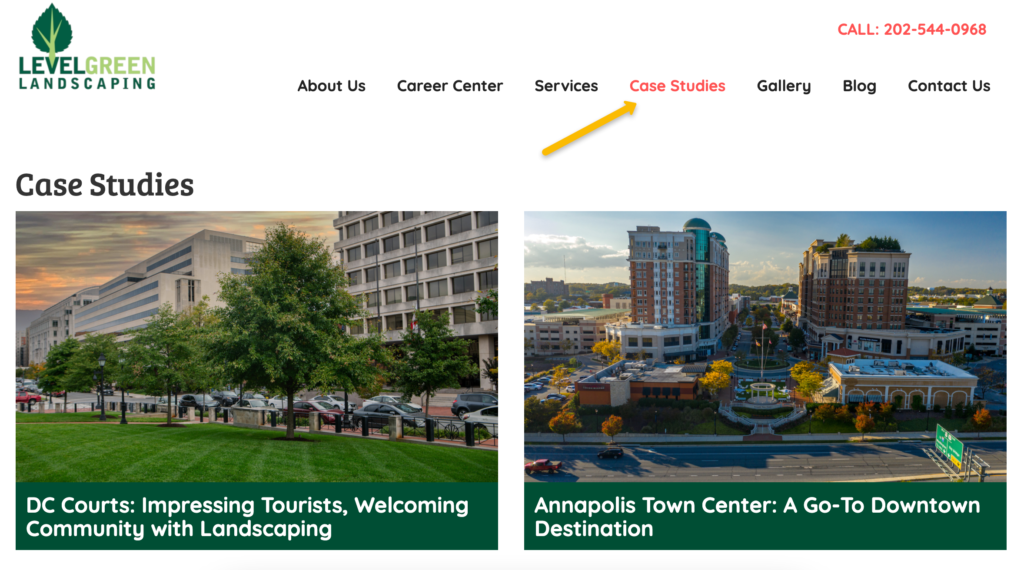
Other strategies
QR codes
QR codes can be used on your business cards, flyers, or other print materials to direct potential customers to your website or a specific landing page.
Customer story for social proof
Share stories from your satisfied customers to build trust and credibility. This could be in the form of testimonials, case studies, or before-and-after photos of your work.
Referrals
Encourage your satisfied customers to refer their friends and family to your business. You could offer a discount or other incentive to encourage referrals.
Events – Tradeshows
Participate in local trade shows or home and garden expos. This can be a great way to meet potential customers face-to-face and showcase your work.
See a comprehensive list of upcoming and past landscaping events, conferences, expos, symposiums, webinars here.
Direct mailing
Send out postcards or flyers to homes in your service area. This can be an effective way to reach potential customers who may not be active online.
Door hanger advertising
Leave door hangers on homes in neighbourhoods where you’d like to work. This can be a cost-effective way to reach many potential customers in a specific area.
Content marketing
Publish content related to home improvement. Distribute this content using social media, Ads, website pages, blogs and sharing.


